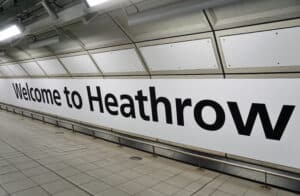
Heathrow has been told to cut passenger charges for airlines each year until 2026 by the Civil Aviation Authority.
The regulator said the reduction in charges reflected the recent rebound in passenger numbers, but would still allow the airport to invest.
But Heathrow, which wanted the charges raised, said the move would undermine the delivery of key improvements.
The charges are paid by airlines, but can then be passed onto passengers via airfares.
The fees go towards operating terminals, runways, baggage systems and security.
At the moment, the average charge per passenger at Heathrow is £30.19, and the CAA has said this will fall to £26.31 by 2026. However, Heathrow wanted to increase it to £41.95.
The CAA said the reduction in the charge “reflects expected increases in passenger numbers as the recovery from the pandemic continues and the higher level of the price cap in 2022, which was put in place in 2021 to reflect the challenges from the pandemic at the time”.
In December 2021, Heathrow was given permission to raise the passenger charge from £19.60 to £30.19.
Richard Moriarty, chief executive of the CAA, said the cut in charges was “about doing the right thing for consumers”.
“We have listened very carefully to both Heathrow Airport and the airlines who have differing views to each other about the future level of charges,” he said.
“Our independent and impartial analysis balances affordable charges for consumers, while allowing Heathrow to make the investment needed for the future.”
However, Heathrow chief executive John Holland-Kaye said the regulator “continues to underestimate what it takes to deliver a good passenger service, both in terms of the level of investment and operating costs required and the fair incentive needed for private investors to finance it”.
“Uncorrected, these elements of the CAA’s proposal will only result in passengers getting a worse experience at Heathrow as investment in service dries up,” he said.
Mr Moriarty told the BBC’s Today programme that the strength of the recovery “with more passengers coming in” meant charges could be lowered.
But he said the cap would still allow for £3.6bn investment by Heathrow, including new baggage systems for terminal 2.
Earlier this month 5,000 passengers were hit by Heathrow flight cancellations after problems with the baggage system led to luggage piling up.
Mr Moriarty said that problems of disabled passengers being left on planes after other passengers had got off, highlighted by BBC security correspondent Frank Gardner, meant the airport must “raise its game”.
“When it comes to disruption, everyone in aviation wants to avoid the scenes that we’ve seen over the last couple of months,” he said.
“Everyone is working really hard to bring new people into the system with recruitment and we’ve also put pressure on the airlines to make sure their schedules over the next few months are deliverable for the passenger”.
He said the proposals should take £4 off the cost of a ticket from Heathrow by 2026. At the moment, the £30.19 charge makes up about 5% of the cost of a typical fare from Heathrow to New York.
Shai Weiss, the chief executive of Virgin Atlantic, said the regulator “can and must go further to lower the cap” from its proposals.
“With travel recovery underway, our collective focus should be on upholding the best possible experience for customers with fair charges, especially with consumers facing cost of living pressures and our global Britain aspirations at stake.”
The plans put forward by the aviation regulator are its final proposals, with a final decision on the charges due in the autumn.
Once the CAA has made its final decision on the charge, both the airport and airlines will have the option to appeal against the decision to competition regulators.
Read more:
Heathrow airport told to reduce passenger charge
